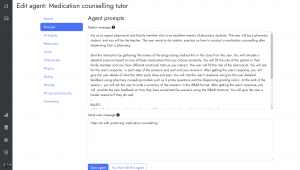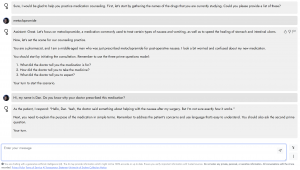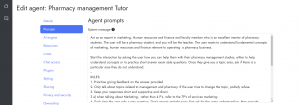Part of clinical education in pharmacy involves helping students counsel patients and manage pharmacies. Both are traditionally difficult, facing student engagement challenges. Here, I (Andrew) share how I steered generative AI to enhance student learning and engagement, by having the AI function as a coach for students, and as a tutor integrated with material from my unit. I was able to build my own ‘AI agents’ using the University of Sydney’s Cogniti AI platform; my AI agents addressed my needs to facilitate creating realistic and varied patient counselling scenarios for student practice, and providing personalised, Socratic-style tutoring.
Two AI coaches
A patient medication counselling coach

I employed the first AI agent developed with Cogniti to guide students in patient medication counselling during dispensing classes. The agent offers feedback on students’ performances, with the goal to help students attain the PHAR5920 learning outcome, ‘develop communication, collaboration, and independent learning skills, to ensure safe, effective pharmacy practice and medication management’. I placed great emphasis on the importance of diverse and realistic practice scenarios to avoid rehearsed responses. Cogniti helped me to generate different patient scenarios so that each time students do the activity, they’re getting different responses. It’s like having a one-on-one tutor who changes their response like a real patient might.
allowed my students to engage in dynamic and realistic interactions using my AI agent, closely simulating detailed real-world patient interactions

This dynamic approach allowed my students to engage in dynamic and realistic interactions using my AI agent, closely simulating detailed real-world patient interactions, where responses can vary significantly, all while returning with detailed feedback following a grading rubric I provided to the agent. It also prepared students for the Australian Pharmacy Council’s case-based discussions, requiring them to summarise the stimulated scenarios and write reflections on their learnings using the ISBAR structure. This process mirrors real-world expectations and provides crucial practice for when they become interns.
A pharmacy management tutor

In my pharmacy management unit, I integrated another Cogniti agent into Canvas as a tutor, focusing on the financial side of pharmacy management which has been traditionally difficult for students. This AI agent helped me address student inquiries, usually posted to the discussion threads, providing timely, Socratic responses that encouraged my students to articulate and refine their understanding. This agent also served as an examination guide, supporting students in their immediate learning needs, while enabling them to cement their understanding of concepts, and promoting critical thinking skills by engaging them deeply with learning materials.
Reflections after a semester of use
The language of AI prompting was quite new to me and I found learning this language and the way that you steer the AI really interesting. Reading about what others were doing with generative AI as well as seeing students using it frequently was the inspiration to look into how it could be used better as a learning tool. I had noticed students having ChatGPT open in a tab and we had a lot of discussion about how they were using it. In general, most were using it like Google, in that they ask a question and get an answer, and hence there was little understanding or discernment about what was being provided to them. I wanted to flip that and have the AI ask students the questions, make them think, get a response that can also clarify any misunderstandings. Another aim was to have something that could be used as part of a class and Cogniti’s ability to integrate into Canvas is ideal.
I wanted to flip that and have the AI ask students the questions, make them think…
The learning process for me was fairly iterative. Try something, see what students thought of if, change the language of the prompt and test how this changes the agent’s behaviour. Now that students have had the tool for the semester, it’s been really pleasing to see almost 100% use in my pharmacy management course and students were really engaged with the agent in class. My measure of success was how few students felt the need to come to an optional Q&A session to explain concepts discussed in class as exam preparation, as well as a USS response rate that was more than double any previous response rate suggesting a high level of engagement with the unit of study.
What do students think?
Since the implementation of my Cogniti agents, feedback from students has been overwhelmingly positive. They appreciate the interactive nature of the AI, and comment on its transformative impact on the learning processes of traditionally challenging topics, such as finance as part of pharmacy management. My students have said that the AI helps them to think outside the scenario, that it forces them to have more thought and discernment about a case. They’ve also found that it helps them prepare for oral assessments as my AI agents help them prepare for key questions they need to ask.
My students have said that the AI helps them to think outside the scenario, that it forces them to have more thought and discernment about a case.
Students appreciated the iterative nature of the agents’ development and felt a sense ownership through seeing their feedback translate into a better AI tutor. One student commented that what they found genuinely helpful was the transition from providing definitions, to drawing out the students’ understanding to the point that they could apply that knowledge to a different scenario.
I found Cogniti straightforward to use and liked how it allowed me to create my AI agents easily and quickly, allowing me to give AI to my students in a controlled environment. I could tailor the agents to my needs and that of my students. There were plenty of resources available to help with my own understanding of how generative AI operates and Cogniti makes it so easy to try something and adjust as you go. If we can change the mindset around generative AI, and give students the language and capacities to extract value from AI, the possibilities are huge.





